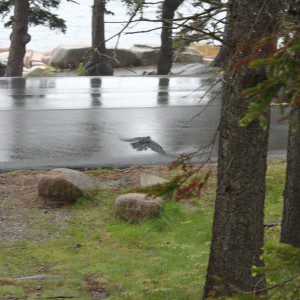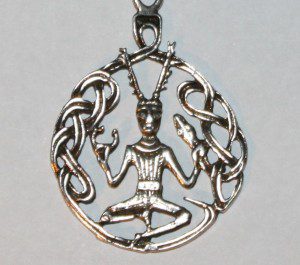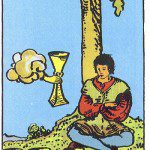 In a comment to the last post on my experience of the Goddess Danu, Lilia asked:
In a comment to the last post on my experience of the Goddess Danu, Lilia asked:
how does one know when a God/dess is calling them? Certainly, I have a couple who interest me, but I don’t really know what to listen for from them.
My first thought was “if you have to ask, she probably isn’t.” There is some truth to that – when deities call they tend to be blatant or persistent or both. Still, that gut-level response isn’t entirely accurate, nor is it a helpful way to answer an honest question.
The best answer I can give is my own experiences. I gave the short version of how I was called by Danu in the last post – she showed up in a vision, and then another, and another, and another. She told me I needed to be a priest, and that I would be her priest.
In August I wrote about my experiences with Morrigan. That post was written in the context of “how do I find a god or goddess?” I found Morrigan gradually, then one day in meditation I heard her say “I want something from you.” The experience was unmistakable and it began two and a half years of service to the Lady of Sovereignty.
Hearing the call of Cernunnos is a much longer story. I first met him deep in the woods when I was a small child who thought there was only one god. I didn’t know who he was and I certainly didn’t know what he was. He was just there… and his presence made a stressful childhood far more pleasant. When I got older I stopped seeing him, but I never lost my love of the forest.
 When I first began my Druid studies I expected I would work with Lugh. I’m no Master of All Arts, but I do have a wide range of interests and Lugh seemed like a perfect fit. Then a good friend went to England – I gave her a $20 bill and asked her to bring me a t-shirt. She felt moved to buy this pendant instead. At first we didn’t know who it was, but eventually we discovered it is Cernunnos. I started meditating on him, and the connection came back to me.
When I first began my Druid studies I expected I would work with Lugh. I’m no Master of All Arts, but I do have a wide range of interests and Lugh seemed like a perfect fit. Then a good friend went to England – I gave her a $20 bill and asked her to bring me a t-shirt. She felt moved to buy this pendant instead. At first we didn’t know who it was, but eventually we discovered it is Cernunnos. I started meditating on him, and the connection came back to me.
While Morrigan was very specific (do this, write that, lead these rituals), Cernunnos’ call has been more personal than the others: become a Druid, become a priest, become his priest. Until I began working on what would become the Cernunnos Ritual, I don’t think he ever asked for anything for himself.
These are my stories. I have others, but they’re similar to these. My encounters reflect the nature of religious experience: they are spiritual, emotional, and highly subjective. As such, they’re open to a wide variety of interpretations. My interpretations are based on my understanding of polytheism: I trust the gods, but I also trust my own true will.
What general conclusions can we draw from these experiences that might be helpful to other Pagans who are wondering if a goddess or god is calling to them?
Again, deities who are calling tend to be blatant or persistent or both. Cernunnos was persistent – he appeared long ago when I wasn’t ready to hear a god. He left me alone when I needed to be alone, and he came back when I was ready to hear him. Danu and Morrigan were blatant – both of them popped into my meditations loud and clear.
I had to be ready to hear them. If Cernunnos had told me he was the Forest God when I was ten years old, I imagine I would have run away screaming. If Morrigan had come to me when I was first exploring Paganism, I would have assumed she was a message from The Goddess and not a goddess, the Lady of Sovereignty – I would not have been able to do what she wanted me to do.
This is why my gut-level response to Lilia’s question is mostly wrong – if you’re on the cusp of being ready to hear, you may not know what to listen for. You may be inclined to interpret a religious experience in a non-religious manner. It’s also one of the reasons I write and speak: to introduce people to the old gods and goddesses so that when they call, people will recognize them.
The vast majority of my messages from deities come in meditation and prayer. Not Eastern-style “empty your mind” meditation (though that practice is also valuable) but a contemplative meditation focused on the image and essence of a particular deity. That process puts me in the proper frame of mind to hear with other-than-physical ears. Even if I don’t experience something in a particular meditation, I often find that openness remains for hours or even days and I see omens and signs in the natural world I would otherwise overlook.
If you think a deity is calling you, ask why. What is he or she calling you for? There is an idea floating around that every Pagan should have his or her own patron deity. This is a nice thought, but it doesn’t align with what our ancient ancestors believed nor with the experience of many contemporary polytheists. The gods have their own areas of interest and responsibility – being your guardian and guide may not be at the top of their priority lists.
On the other hand, Cernunnos has been very patient with me, at times even nurturing. I know I’m not the only one. While divine patronage was uncommon in the ancient past, many contemporary Pagans do have patron deities. But not all. Don’t assume that any contact is an offer to be your patron, or even that you should have a patron. People and gods are all unique – no two relationships are identical.
If a goddess or god is calling you, odds are good she or he wants you to do something: make an offering, tell a story, do something to help his or her work, or do something to make yourself ready to do something bigger at some point in the future. Be prepared to respond with action.
That something may or may not include priestly work. Priesthood is a special calling and is not to be taken lightly. Priests and priestesses are people who have taken special obligations to perform special services for an extended period of time. For all I have done for and with Morrigan, she has not called me to be her priest. But that hasn’t stopped her from asking me to do things for her. As with the question of patronage, don’t assume you should be a priest or priestess.
Just to be clear: modern Paganism generally takes a very Protestant approach to priesthood. All Pagans are priests in that you don’t need a specialist or other intermediary to approach the gods. Those who are called to priesthood – those who I would call priest or priestess – are servants of a particular deity or deities with an obligation to do their work in this world. Or they are servants and leaders of a particular group – they are clergy. See Jason Mankey’s excellent piece Becoming a High Priestess for more on what that looks like.
Even when you hear a call, the cold hard truth is that you can never be sure it’s a goddess or god calling you. Maybe it’s an ancestor or a Nature spirit. Maybe it’s your own higher self. Maybe it’s your ego, trying to drown out the call of the gods. That’s the nature of religious experience – certainty is not possible.
So ask yourself if what you’re hearing is consistent with what’s known about this particular deity. Is it “in character” for him or her? If Cernunnos tells you to plant trees, it’s probably him. If the message is to buy a Hummer, it’s probably not. And if you can’t answer that question, it’s time for more research – read the ancient stories of that god and talk to his contemporary followers.
Ask yourself if what you’re hearing is challenging you to do something different – to change the way you worship, the way you live, the way you think, the way you relate to the rest of the Universe. The gods are busy and they don’t need idle followers. They need people who will be their hands in this world.
Finally, ask yourself if you’re ready to hear the call of the gods. While you can and should retain your sovereignty even when dealing with the gods, what is heard cannot be unheard and what is promised cannot be undone.
I hope this piece has been helpful to Lilia and to others who are wondering if that odd feeling, that strange sighting, that thought that won’t go away, is the call of a goddess or god. In the end, all I can say is that this is what I’ve heard, this is what I’ve experienced, and this is what I’ve done.
And I’m very glad I did.
















